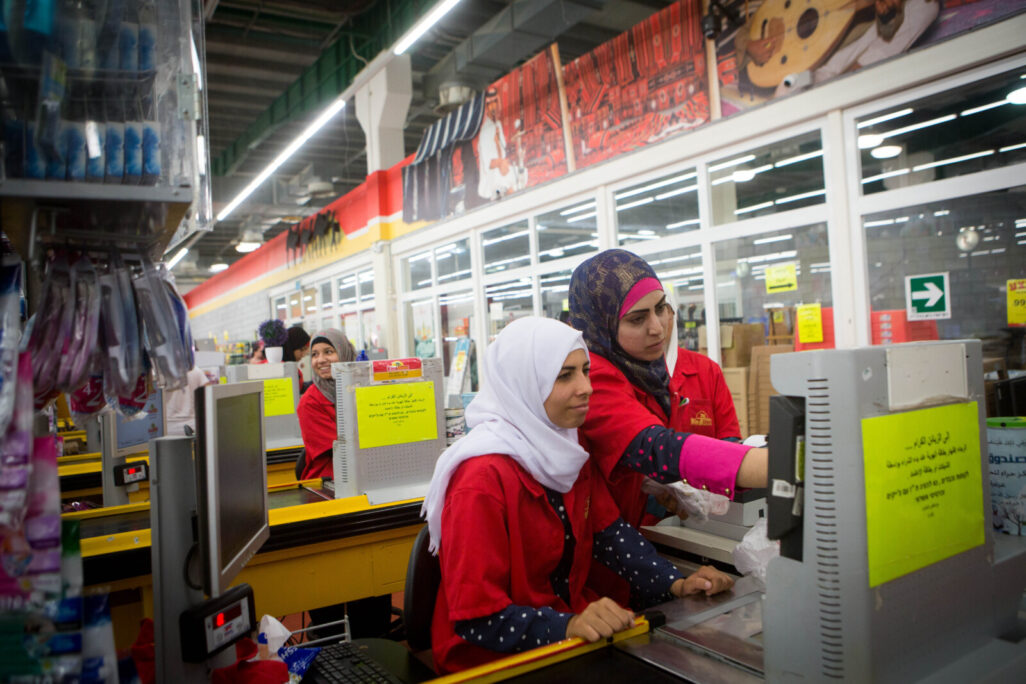
A new survey revealed mainly positive trends in relations between Jewish and Arab workers in mixed workplaces in Israel. The survey was conducted by the Abraham Initiatives organization and the Afkar research institute this March, five months after the outbreak of Israel’s current war against Hamas.
The survey found that 83% of Arab workers and 72% of Jewish workers reported the state of relations between Arabs and Jews at their workplace to be good or very good. Only 1% of Arab respondents and 2% of Jewish respondents reported that there are "bad relations," with the remainder describing relations as reasonable.
The survey included 660 Jewish respondents and 607 Arab respondents, all of whom work in mixed companies and organizations in fields such as commerce and industry, health, transportation, high-tech and the public sector. The survey did not include employees in education and teaching.
Majorities Feel Little Tension, but Still Avoid Discussing War
Most of the respondents said that since the beginning of the current war, they did not experience increased tensions between Jews and Arabs in the workplace (36%), or that they experienced tensions to a small extent (27%). Only about 15% of Jewish or Arab workers responded that they experienced tension between the groups to a large extent.
46% of Arab respondents say that they feel comfortable speaking Arabic in the workplace, compared to 6% who do not feel comfortable. 48% of Jewish respondents stated that they did not stop commercial engagement with Arabs following the war, while 10% stated that they have stopped completely.
Fifteen percent of Arab respondents say that they have encountered cases of discrimination in the workplace, compared to 8% of Jewish respondents. However, 55% of Jewish respondents said that they had not encountered any such discrimination, as did 39% of Arab responders.
Most of the respondents (56% of Jews and 76% of Arabs) said that their opinions about the second group has not changed following the start of the war in Gaza. Thirty-four percent of Jewish workers responded that their views towards Arab workers had changed for the worse, while only 10% of Arab workers responded that their attitudes towards their Jewish colleagues had worsened. Nine percent of Arab employees even said that their views towards their Jewish colleagues have changed for the better.
In general, the workers seem to avoid discussing the October 7th massacre and the ensuing war. Half of Arab respondents and about 39% of Jewish respondents reported that they do not think it is necessary to talk about the situation in the workplace. Sixty percent of Arab workers and 48% of Jewish workers said that they have not engaged in such a discourse. The majority of those who did discuss the issue testified that the conversation was positive (44% of Arabs and 40% of Jews) or neutral (42% of Arabs and 39% of Jews). Only 13% of Arab respondents and 17% of Jewish respondents claimed that the discourse was negative.
Jews in Workplaces that Invest in Inclusion were Less Likely to Report Negative Change in Attitude towards Arab Colleagues
The survey also found that employees tend to experience an increased sense of belonging in workplaces where the management has invested in developing positive Jewish-Arab relations. Accordingly, 47% of Jewish employees who said that they believe that their workplace invests in diversity also reported that they feel an increased sense of belonging. In contrast, only 37% of Jews who do not believe that their workplace invests in positive multicultural relations reported an increased sense of belonging. The results were similar among Arab workers, with 51% of workers who believe that their workplace invests in diversity noting an increased sense of belonging, while only 42% of those who did not believe their workplaces invested in diversity claimed to feel such a sense of belonging.
Furthermore, Jewish employees who feel that management invests in diversity and inclusion tended to have more positive attitudes, opinions and feelings towards their Arabs coworkers. While 34% of all Jews surveyed responded that their attitudes towards their Arab colleagues have become more negative, only 23% of Jews who felt that their workplace invests in Arab-Jewish relations also reported a negative change in their attitudes.
Dr. Thabet Abu Rass and Amnon Be’eri-Sulitzeanu, Co-Executive Directors of the Abraham Initiatives, said that, "It is encouraging to discover that many shared workplaces are an island of stability, which maintains a normal structure of relations between Jews and Arabs. This is in marked contrast to the difficult atmosphere and the accompanying tension to relations between Jews and Arabs in almost every other area. The survey shows that workplace investment in the relationship between Arabs and Jews increases positive feelings. We call on workplaces to invest in fostering the relationship."
This article was translated from Hebrew by Ronen Cohen.






